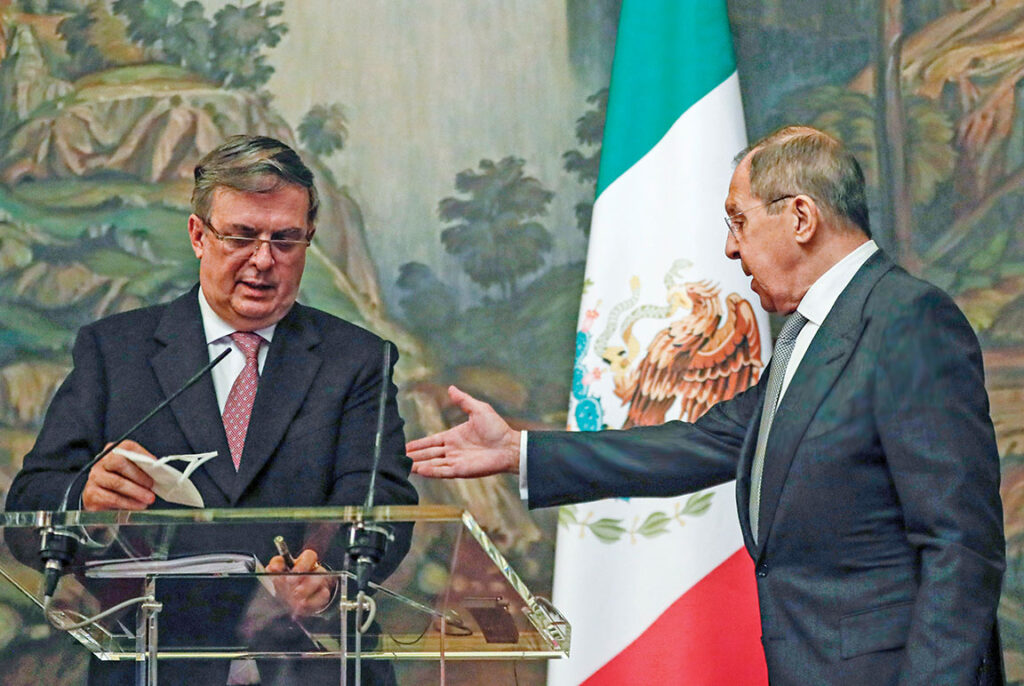Mexican Foreign Minister Marcelo Ebrard, left, and Russian Foreign Minister Sergei Lavrov attend a news conference after their meeting in Moscow in April 2021. Mexico agreed at the meeting to begin bottling and packaging the Russian vaccine. THE ASSOCIATED PRESS
UNITED KINGDOM MINISTRY OF DEFENCE
Russia is deliberately targeting Mexico with information operations (IO) since the Ukraine invasion with the goal of sowing distrust toward NATO states and influencing Mexicans to support Russia’s actions. The campaign cannot generally be considered successful so far. Most Mexicans blame Russia, and Mexico usually supports Ukraine in the United Nations. However, Russia is becoming increasingly aggressive in Mexico, where apathy about the war is high.
Methods
Russia has a sizeable Spanish-language media enterprise, which includes channels banned in the European Union and the United States. This is bundled with cable packages in Mexico including RT en Español/Actualidad, Sputnik Mundo and TASS, in addition to official and unofficial social media sites.
One study shows that the highest viewership outside Russia for state-owned RT International, formerly Russia Today, is Spanish speaking, and that 11% of RT en Español content mentions Ukraine. The Brookings Institution says the Russian Embassy in Mexico and independent journalists are the most popular sources on Twitter/X for pro-Russian content. Research by the Oxford Internet Institute examining disinformation posts from Russian embassies globally found the embassy in Mexico to be one of the most prolific.
So-called diplomats are another source of disinformation. Since the invasion, Russian “diplomatic” accreditations have skyrocketed, with a 60% increase. Despite having few economic or cultural ties with Mexico, Russia has nearly twice as many diplomats as the U.S. IO themes include victimhood, warnings of nuclear war, blaming the West for the invasion, falsely attributing atrocities, questioning NATO’s motives, and highlighting tensions between the U.S. and Mexico on issues such as immigration and drugs. Russia pushes back on damaging stories like claims that Putin is ill or that the Sputnik COVID-19 vaccine, issued to Mexicans, is ineffective.
Intended audiences
There are numerous audiences. One that stands out is the grouping of left-wing political actors, such as the Morena Party Youth Wing. (The Morena Party is the incumbent government party.) On March 4, 2022, the Morena Party Youth Wing publicly expressed “moral and political support” for Russia’s decision to invade Ukraine — a statement later rejected by the main party. Also, in the month after the invasion, a Russia-Mexico Friendship Group involving left-wing Mexican politicians was established, indicating Russia’s probable intent to co-opt decision-makers and influence the Mexican government.
The playbook
Russian disinformation in Mexico is self-reinforcing and trades in conspiracy. It typically identifies existing rifts in society and attempts to widen fissures. In some cases, complete fabrications are created. Russia may identify a socioeconomic or political issue it wishes to exploit, like fentanyl abuse. It may then use social media accounts to amplify, edit or construct misinformation. Then a state-owned “news agency,” such as RT, will report on the issue and the Russian ambassador or minister may comment on the story.
For example, on May 31, 2023, RT twisted the words of a Mexican reporter to suggest U.S.-supplied antitank weapons from Ukraine had been sold to Mexican cartels. A fake article in a Mexican newspaper also appeared regarding the number of Ukrainian arms now in Mexico City. The Russians repeated the lie in person (via diplomats) and virtually (via social media), thereby exploiting Mexican government fears about arms control. Russian IO is not only dangerous for Mexicans, but it also can have an indirect effect elsewhere if echoed.
In September 2022, the Russian Embassy in Mexico posted a picture of a U.S. helicopter and suggested it was spotted over the Nord Stream pipeline just before the gas explosion. This claim was picked up by Russian Spanish-language programs, online platforms and independent Mexican journalists for comment and further dissemination to sow distrust in U.S. motives toward Ukraine.
When analyzing the effectiveness of Moscow’s campaign, it is easy to focus on the fact that Russia isn’t popular, or that its claims are unbelievable. However, Russian IO is more about negatively affecting an enemy and unstitching the fabric of truth rather than making friends.
Conclusion
More should be done to combat Russian IO in Mexico because apathy about the war remains high and the government often presents itself as neutral, which provides fertile ground for Russian lies.
While respecting Mexico’s sovereignty, more effort is needed on education, counter-disinformation and persuasion. This will require greater resources and more engagement with Mexico. Most importantly, this should be a combined, multipartner effort with Mexico, synchronizing our collective voices and embracing individual expertise. Russian Spanish-speaking media also must be held to account before it is too late.

